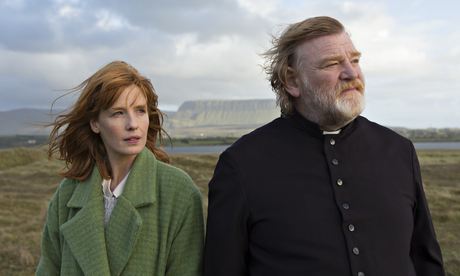
John Michael McDonagh could yet be the Anthony Mann or the Fred Zinnemann of modern Irish cinema. He is at home in Ireland's Wild West, and makes the Knocknarea mountain of County Sligo look like northern Europe's answer to Monument Valley. His lawman here is Brendan Gleeson, playing Father James Lavelle, an embattled priest facing a high-noon confrontation with one of his flock. Gleeson is craggy, troubled, burdened, drolly resentful … part Gary Cooper, part Pat O'Brien, part Clement Freud.
Calvary is a different proposition from his black comedy The Guard, from 2011, in which Gleeson played a highly unconventional cop. It's bleaker and dourer – and less anti-clerical than you might expect. There are fewer laugh lines and zingers. Occasionally it looks as if it is straining for maturity. The film begins with a character being reproved for irony, and ends with that same character reproving someone else for cynicism. It's as if McDonagh is having an angry argument with himself about tone, attitude and about the subject matter to which these things are to be applied: modern, post-Catholic Ireland. Calvary makes an interesting companion piece to Stephen Frears's Philomena. It presents us with a satirical image of a country which is cracked and fractured into pieces, a crazy-paving that isn't fitting together. Without the powerfully charismatic Gleeson, I suspect, the film itself wouldn't fit together.
Father James is not a stereotypical priest who entered the seminary at 18: he found his vocation in middle age, having been married, and now with a grownup daughter, Fiona (Kelly Reilly), who is suffering from depression. James himself is a widower and a recovering alcoholic, and it could be that religion is a way of "white-knuckling" his way past his problems, and past Fiona's, too.
James's life reaches a crisis in the confession box. An unseen voice tells him about the horrific child abuse the speaker suffered and how he now intends to get closure by killing James in seven days' time, despite or because of the fact that James is a genuinely good priest. As this anonymous figure has not asked for absolution, James is not bound to silence – unlike, say, Montgomery Clift in Hitchcock's I Confess (1953) – but having recognised the voice, James feels challenged to resolve this man's agony without naming him to the authorities or the audience. (There is an unstressed "whodunnit" quality to the story, for those who want to pursue it.) Yet as the days pass, James feels the situation growing into something grimly and pointlessly sacrificial: he could be an anti-Thomas-Becket, a non-saint whose death will have no meaning for a secular society. And is he, in fact, as innocent as all that?
The priest is regarded locally with mixed feelings: a Jonsonian gallery of scorn. Pub landlord Brendan (Pat Shortt) nurtures icy hostility. The atheist hospital doctor Frank Harte, played with a semi-permanent, psychopathic grin by Aiden Gillen, baits James daily, while Dylan Moran plays Fitzgerald, a self-hating retired banker grown rich on Ireland's ruinous finance bubble, who taunts James with offers of a donation. The priest must, moreover, occasionally visit an imprisoned serial killer (played by Gleeson's son Domhnall Gleeson) but epiphanies and redemptive insights are thin on the ground. The pastoral problem he must tackle, apart from his own impending murder, is the black eye being sported by Veronica (Orla O'Rourke): is she being assaulted by her husband, Jack (Chris O'Dowd) or her boyfriend, Simon (Isaach De Bankolé), an incomer from the Ivory Coast? James's attempts to address this issue have a wretched outcome: he is accused of arrogance, racism and irrelevance. Is there a congregation for James to address, a community of souls that makes sense of his position as priest? It doesn't look like it.
The title can only be read ironically: Father James doesn't endure a transformative agony. He is not clarified, ethically or spiritually, by the experience, and feels more immediate emotion for his dog than for the fate of those innumerable victims of child abuse, though there is a kind of heroism, short of martyrdom, in actually admitting it.
Opinions will differ on how McDonagh concludes this strange ordeal. It could be that the more pessimistic register he attempts is not as successful as the more obviously comic voice he found in The Guard, and some might be uneasy at the way his priest character, however flawed, appears to have a monopoly in moral self-questioning. But I found myself carried along by this film. There is an exhilaration in its alienation and anger.

